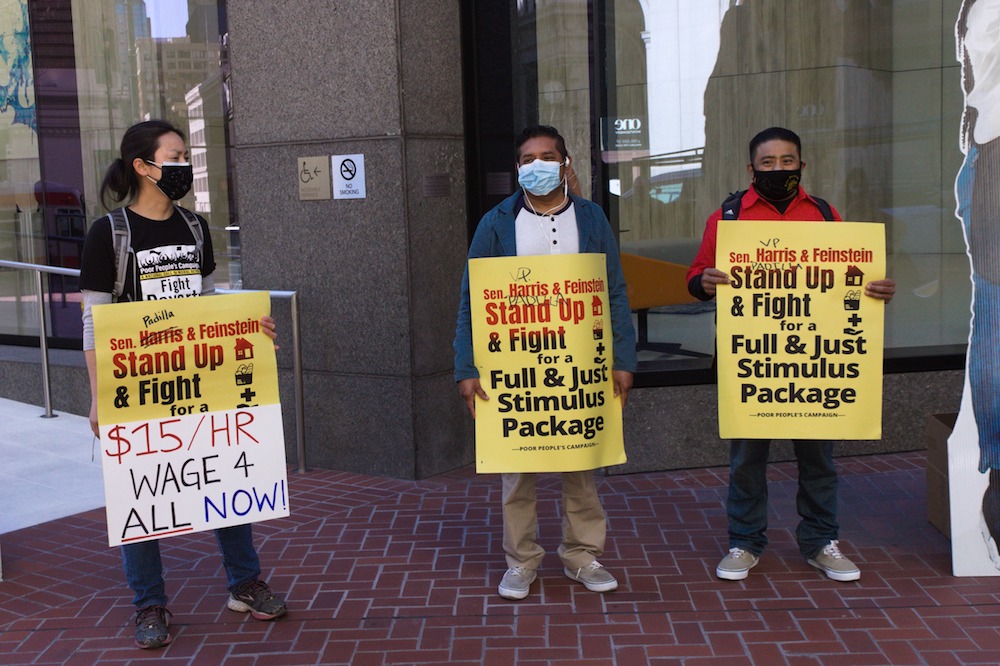On Feb 22 nearly two dozen restaurant workers and organizers from The Poor People’s Campaign and One Fair Wage gathered outside Senator Dianne Feinstein’s Office on Post Street in San Francisco as part of a nationwide action pressuring Democratic senators to vote in favor of Biden’s $1.9 trillion stimulus plan, called the American Rescue Plan, which now includes the Raise the Wage Act.
The Raise the Wage Act, which was introduced in the Senate by Bernie Sanders along with several other senators, including Feinstein, on Jan 26, would raise the federal minimum wage to $15 an hour by 2025. Rallies were held around in major cities around the country, including San Francisco, Chicago, New York, Washington DC, Phoenix, and Detroit.

This action was organized largely because the Raise the Wage Act is at risk of being dropped from the America Rescue Plan, due to the lack of support from two moderate Democratic senators, Joe Manchin, D-West Virginia and Kyrsten Sinema, D-Arizona.
The relief package will likely be passed by the Senate through a budget reconciliation process, which requires a simple majority of 51 percent instead of 60 percent, which is necessary due to the Democrats’ narrow control the Senate and the lack of support from Republicans.
Yet, the two dissenting Democratic senators say that the Raise the Wage Act is an “extraneous” matter to the budget process and is therefore prohibited from being included in the Biden package under the Byrd Rule, which says that matters not directly related to the budget cannot be included in budget reconciliation bills. Manchin has instead proposed that the Raise the Wage Act raise the federal minimum wage to $11 an hour rather than $15.
In the face of this opposition, however, demonstrators remained committed to getting the Raise the Wage Act as it is currently written to be passed along with the Biden stimulus package, which will likely be voted on in the Senate this week.
“We’re pushing for it [the Raise the Wage Act] to be included in COVID relief specifically…We’re out here saying ‘no,’ our colleagues in West Virginia deserve 15 [dollars an hour],” said Madison Ashley, a field organizer with the Poor People’s Campaign, a nationwide grassroots organization pushing for increased wages and workers’ rights. “We want it all.”
Mario Chavarria, a former Oakland restaurant worker and organizer with One Fair Wage, said that restaurant workers often work full-time, only to receive paltry paychecks which barely cover living expenses in the notoriously pricey Bay Area, impacting the quality of life for many working-class families as they cut costs to get by.
“The extreme stress caused by the cost of living has taken on a life of its own…a coworker of mine some years ago had to choose between throwing his daughter a birthday party at a pizza restaurant and paying the electric bill at his house,” said Chavarria.
Another benefit of raising the minimum wage is that it could make workers less dependent on tips for income, and make financial planning easier, according to Chavarria.
“Tips are going to be less in the next year, and in order to prepare, if they knew they were getting $15 an hour…it would help people to get a more stable income month to month when tips aren’t as prevalent,” said Chavarria.
Under federal law, workers who regularly earn $30 or more in tips a month are deemed a “tipped worker” and can earn a cash wage as low as $2.13 an hour, with tips given to workers being used by employers as a credit to cover the rest the workers’ minimum wage of $7.25 an hour, unless otherwise specified by state law. Only 23 states that use a tipped wage compensation structure have a combined cash plus tips wage set above $10 an hour, effectively making the minimum wage for workers who receive tips in nearly half the country at under $10 an hour.
While this tipped wage compensation structure is not allowed in California, which requires employers to pay the full minimum wage of $14 an hour if there more than 25 employees, and $13 an hour for smaller businesses, workers’ dependence on tips for their income in many parts of the country can create problematic situations where restaurant workers, who are often women and people of color, must sometimes endure poor treatment from customers to ensure they receive tips, or may even receive fewer tips altogether if they do not directly interact with customers, according to Yuka Ioroi, owner of Cassava, a restaurant located in San Francisco’s Richmond neighborhood.
“It is time we address the inequity of the two-tier wage system that makes our workforce in 43 states rely on tips as a bulk of their income. These workers, who are disproportionately women, are more likely to endure inappropriate behavior, harassment, and abuse from customers. It also creates disparities in wages between front of house and back of house staff, which has negative effects on workers of color,” said Ioroi. “We need to remember what makes restaurants special is our workers…We are given a unique opportunity to reflect and use this moment as a catalyst of change.”




